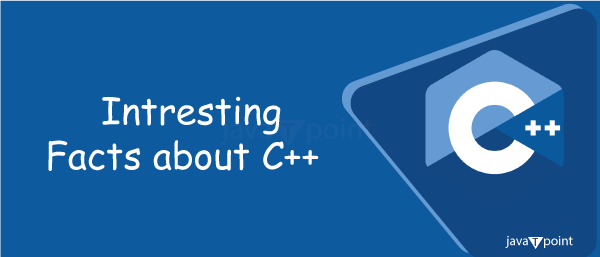Interesting facts about C++
Introduction of C++
C++ was developed by Bjarne Stroustrup at Bell Laboratories in the early 1980s. It is a versatile and powerful programming language based on the C programming language. Its primary goal was to introduce object-oriented programming features while maintaining the characteristic efficiency and flexibility of C.

C++ supports both procedural and object-oriented programming paradigms, allowing programmers to choose the approach that best suits their needs. It is known for its efficiency and offers low-level data manipulation, direct memory access, and functions such as pointers for fine-grained resource management. The inclusion of the Standard Template Library (STL) further enhances its capabilities by providing common classes and functions for efficient and reusable code.
C++ is a multi-paradigm language, platform-independent and compatible with C, which facilitates the integration of C libraries and code. C++ is widely adopted in areas such as systems programming, game development, and high-performance computing and is constantly evolving with new standards, such as its latest version, C++20. Its active community, broad ecosystem, and applicability across industries underscore its continued importance in the world of programming.
Here are some interesting facts about the C++ programming language:
- Development from C: C++ is an extension of the C programming language. "++" in C++ language, C++ stands for addition operator, which indicates that C++ is better than C.
- Object-oriented roots: One of the main motivations for creating C++ was to add object-oriented features to C. This inclusion allowed the code to be better organized and structured using concepts such as classes and objects.
- Bjarne Stroustrup invention: Danish computer scientist Bjarne Stroustrup developed C++ at Bell Laboratories in the early 1980s. His work aimed to improve C with features such as classes, derived classes, and virtual functions.
- Standard Template Library (STL): The C++ STL is a powerful collection of template classes and functions that provide general programming support. It includes containers, algorithms, and iterators that allow developers to write efficient and reusable code.
- C++ is everywhere: C++ is widely used in various industries and applications. It has helped develop operating systems (e.g. Windows), game engines (e.g. Unreal Engine), browsers (e.g. Mozilla Firefox), and databases (e.g. MySQL).
- Multi-paradigm language: C++ is often called a multi-paradigm language because it supports procedural, object-oriented, and general-purpose programming. This flexibility allows developers to choose the programming style that best suits their projects.
- Performance efficiency: C++ allows low-level data manipulation and direct memory access, making it suitable for performance-critical applications. The language provides features such as pointers and manual memory management, providing fine-grained resource management.
- Compatibility with C: C++ is designed to be compatible with C, allowing programmers to seamlessly integrate C code into C++ programs. This feature facilitated the gradual adoption of C++ in existing projects.
- Community and Standards: C++ has a large and active developer community. The language is constantly evolving with new standards.
- Smart pointers: C++ introduced smart pointers, which are objects that act like pointers but provide additional functionality such as automatic memory management. They promote safer and more robust memory management in C++ programs.
- Standardization of C++: The first standardized version of C++ was released in 1998 and is commonly known as C++98. Later versions include C++03, C++11, C++14, C++17, and C++20. Each new standard brings improvements and features to the language.
- RAII (Resource Acquisition Is Initialization): C++ promotes the RAII principle, which encourages automatic management of resources during the lifetime of objects. This concept simplifies resource management, such as memory allocation and deallocation, by tying it to the lifetime of objects.
- Lambda expressions: C++11 introduced lambda expressions, which allow programmers to define anonymous functions within text. This feature improves the expressiveness of the language and is particularly useful in functional programming.
- Concurrency support: C++11 introduced features that support multiple threads and concurrency, including threads, condition variables, and atomic operations. It allows programmers to write concurrent and parallel programs more easily.
- STL Algorithms: The C++ Standard Template Library (STL) provides several algorithms that can be applied to various data structures. These algorithms, such as sorting and searching, increase the productivity and readability of C++ code.
- Operator overloading: C++ supports operator overloading, allowing programmers to define custom functions for users. This feature improves the expressiveness of code and is often used when creating user-defined types.
- Template Metaprogramming (TMP): C++ templates allow metaprogramming, where programs can be created and executed at compile time. Pattern metaprogramming is a powerful technique used to create highly flexible and efficient code.
- Cross-platform development: C++ is often used for cross-platform development because of its portability. Applications written in C++ can be translated to different platforms with minor changes, making it a popular choice for software that needs to run on multiple operating systems.
- Popular game development language: C++ is widely used in game development. C++ is widely used in game engines such as Unreal Engine and Unity, making it the language of choice for creating powerful and visually impressive games.
- Modern programming languages: C++ has influenced many modern programming languages, including Java and C#. These languages introduced and adapted concepts such as object-oriented programming and syntactic elements.
|

 For Videos Join Our Youtube Channel: Join Now
For Videos Join Our Youtube Channel: Join Now









